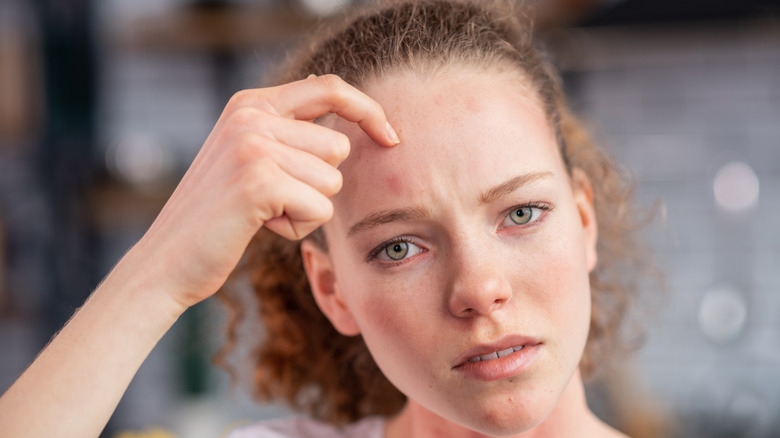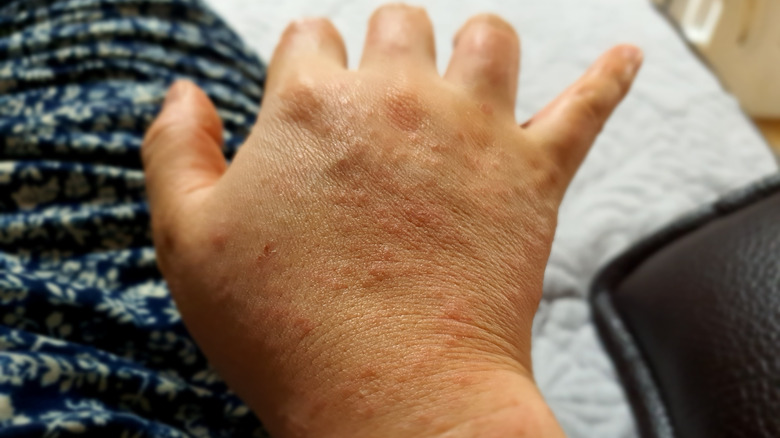What It Really Means When Your Forehead Itches
Have you ever noticed that you are frequently reaching up to scratch your forehead? It may just be a subconscious habit or nothing at all, but if you're itching enough to take notice, it's worth investigating. Otherwise, you could be left distracted and frustrated. On top of that, if you scratch enough, you could end up with marks on your skin from rubbing and aggravating the area.
Itchy skin is a medical condition called pruritus, and its causes can range from psychological issues to irritants on the skin, according to Healthline. When your skin itches, there may be many reasons and many courses of treatment. If the reason is something that bothers you more than once, then there's likely a way to identify and manage it.
Chemicals are a common irritant and can cause a reaction with even a single exposure (per Cleveland Clinic). However, this isn't the only cause and it may be something else. So how can you tell what it really means when your forehead itches?
The reason your forehead is itching
If your skin is itchy, it can be troubling when there are no visible signs on the skin to indicate a cause. Luckily, there are a few common reasons behind these unseen forehead itches you can explore when this occurs. General skin hygiene issues, such as overly dry skin, can cause itching (per Healthline). Allergens that come in contact with your skin can also cause a reaction that may lead to skin irritation, such as seasonal allergies. Surprisingly, the products you use to style or clean your hair can contain ingredients that may dry the skin or irritate it. Lastly, your favorite hat or headband could cause your itch depending on how hot the weather is and how often you wear it.
When there is a noticeable rash or mark with itching, there are other sources to investigate as the possible cause. Check your forehead for sunburn, especially if you've been outside recently, as it can sneak up on you and cause an itch (via Healthline). Stress may seem like a mental or emotional plight as it causes distress, but it can subsequently appear as a rash on the skin, according to Medical News Today. Per the U.S. Centers for Disease Control and Prevention (CDC), insect bites such as mosquitoes can also arise as red marks, bumps, or blisters that you may overlook until they begin itching. Fortunately, many simple itch treatments can be applied at home.
Treating your forehead itch
The first step in treating your itch is to wash the skin with gentle soap and ensure it is hydrated with nonirritating lotion (via Healthline). This can help moisturize dryness or clear off any irritants. Colloidal oatmeal, an ingredient in moisturizers, helps to calm irritated skin by providing vitamins, proteins, and nutrients.
Antihistamines are drugs that can help calm the body's reaction to allergens (per WebMD). They reduce the immune system's histamine response, which can lead to itching, swelling, and other symptoms like sneezing.
Baking soda can help relieve itching for many skin conditions. It can be applied topically or used as a soak (via Healthline).
According to an interview with dermatologist Dr. Shilp Khetarpal published by Cleveland Clinic, "cold distracts your nerves." This means an ice pack can help treat the issue more generally.
When dealing with an itchy forehead, it is also wise to avoid things that can worsen the problem. Dr. Khetarpal noted that these include apple cider vinegar, aloe vera, and moisturizers with fragrances. These otherwise would-be remedies include preservatives, dyes, and acids that can intensify your itchy condition rather than relieve it. Other elements to avoid when dealing with itching skin include excessive heat exposure, such as hot showers and too much time in the sun (per Healthline).
So next time you notice an itch on your forehead, do yourself a favor and take a second to review the possible reasons behind it before you start scratching.



